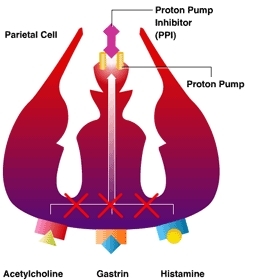Riesgo Ácido-Represivo del aumento de Meds de la pulmonía Hospital-Adquirida
por
Lynn Shapiro, Writer | May 27, 2009

Proton-pump inhibitors
have a 30 percent increased risk
of causing a patient
to develop pneumonia while
in the hospital
Hospitalized patients who receive acid-suppressive medications such as proton-pump inhibitors, have a 30 percent increased risk of developing pneumonia while in the hospital, according to a study in the May 27 issue of JAMA.
With the introduction of proton-pump inhibitors, used primarily in the treatment of ulcers and gastroesophageal reflux disease, the use of acid-suppressive medications has jumped significantly over the last several years, with estimates that between 40 percent and 70 percent of hospitalized patients receive some form of this medication.
Shoshana J. Herzig, M.D., of Beth Israel Deaconess Medical Center, Boston, and colleagues examined the association between acid-suppressive medication use and hospital-acquired pneumonia. The study included data on patients who were admitted to a large, urban, academic medical center from January 2004 through December 2007, including patients who were at least 18 years of age, hospitalized for 3 or more days, and not admitted to the intensive care unit.
Acid-suppressive medication use was defined as any order for a proton-pump inhibitor or histamine2 receptor antagonist. The study included data on 63,878 hospital admissions.
Overall, acid-suppressive medication was ordered in 32,922 admissions (52 percent). Of the group who received these medications, 27,236 (83 percent) received proton-pump inhibitors and 7,548 (23 percent) received histamine2 receptor antagonists, with some exposed to both. The majority of these medications were ordered within 48 hours of admission (89 percent).
Hospital-acquired pneumonia occurred in 2,219 admissions (3.5 percent). The unadjusted incidence of hospital-acquired pneumonia was higher in the group exposed to acid-suppressive medication relative to the unexposed group (4.9 percent vs. 2.0 percent). After further analysis and adjusting for potential factors that could influence the outcomes, receiving acid-suppressive medications was associated with a 30 percent increased odds of hospital-acquired pneumonia. The association was significant for proton-pump inhibitors but not for histamine2 receptor antagonists.
The researchers write that acid-suppressive medications have been thought to increase the risk of pneumonia via modification of upper gastrointestinal bacteria, and, as a result, respiratory bacteria.
"These results occur in the context of an increasing body of literature suggesting an association between acid-suppressive medication and pneumonia. Further scrutiny is warranted regarding inpatient prescribing practices of these medications," the authors conclude.
Beth Israel Deaconess Medical Center
